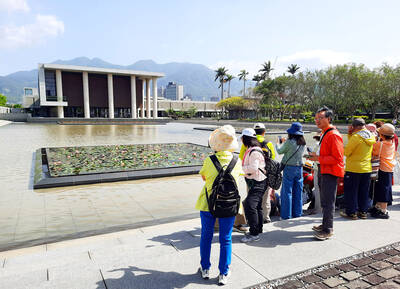How an international megastar, Zhang Ziyi (章子怡) is riding a crest of Chinese fever in Hollywood and has easily scored two movie deals with big-name producer Harvey Weinstein, with another in the offing. Two confirmed projects will see Zhang play a young woman passing herself off as a man in the well-know Chinese story Hua Mulan (花木蘭) and team up with George Clooney in a remake of Japanese master Akira Kurosawa's 1954 classic Seven Samurai.
Exactly why an American actor has been picked to play the leading samurai role, producer Weinstein didn't say. Casting non-Western actors for all the leading roles would, of course, be asking too much from Hollywood.
Taiwan's pride and joy Ang Lee (李安) is ready to shoot his next project Lust Caution (色戒) based on Eileen Chang's (張愛玲) novel of the same title in September and will return to Taiwan next week for auditions. It was said that more than 30 veteran actors and teen-idols have signed up for the coveted honor of appearing in the movie.
Ang Lee's brother Khan Lee (
According to Khan Lee, Big S (
The leading lady in Hong Kong director John Woo's (吳宇森) Battle of the Red Cliff (赤壁之戰), local supermodel Lin Chi-ling (林志玲) was in Xian (西安), China, last week to attend the extravagant banquet thrown by Longines as the watch brand's celebrity spokeswoman. After paying taxes of some NT$5 million this year, the wealthy lady whined that forking out such a large wedge of cash hurt a little and said she would consider buying expensive watches from now and claim them as tax deductible.
Other local catwalk queens contributed their fair share to the national treasury. Shatina Chen (
Mando-pop queen Jolin Tsai (蔡依林), on the other hand, has lost out on a lucrative deal with Motorola after the mobile-phone maker ditched her.
Spotted by local paparazzi using a mobile phone made by Sharp a couple of months ago, Tsai's treacherous misconduct pissed Motorola off, and prompted the company to sign up members of the four-piece pop/rap outfit Nan Quan Mama (
Tsai suffered another slap in the face last week, this time by Bvlgari. As the brand's celebrity guest at a party, Tsai expressed her keen interest in the brand's luxuries and tried to squeeze two free pieces of jewelry out of the Russian fashion house instead of the one promised by the fashion empire. Bvlgari stuck to its guns and assured the greedy star that one piece of jewelry was more than enough to pay for her brief appearance at the show.

When the South Vietnamese capital of Saigon fell to the North Vietnamese forces 50 years ago this week, it prompted a mass exodus of some 2 million people — hundreds of thousands fleeing perilously on small boats across open water to escape the communist regime. Many ultimately settled in Southern California’s Orange County in an area now known as “Little Saigon,” not far from Marine Corps Base Camp Pendleton, where the first refugees were airlifted upon reaching the US. The diaspora now also has significant populations in Virginia, Texas and Washington state, as well as in countries including France and Australia.

On April 17, Chinese Nationalist Party (KMT) Chairman Eric Chu (朱立倫) launched a bold campaign to revive and revitalize the KMT base by calling for an impromptu rally at the Taipei prosecutor’s offices to protest recent arrests of KMT recall campaigners over allegations of forgery and fraud involving signatures of dead voters. The protest had no time to apply for permits and was illegal, but that played into the sense of opposition grievance at alleged weaponization of the judiciary by the Democratic Progressive Party (DPP) to “annihilate” the opposition parties. Blamed for faltering recall campaigns and faced with a KMT chair

Article 2 of the Additional Articles of the Constitution of the Republic of China (中華民國憲法增修條文) stipulates that upon a vote of no confidence in the premier, the president can dissolve the legislature within 10 days. If the legislature is dissolved, a new legislative election must be held within 60 days, and the legislators’ terms will then be reckoned from that election. Two weeks ago Taipei Mayor Chiang Wan-an (蔣萬安) of the Chinese Nationalist Party (KMT) proposed that the legislature hold a vote of no confidence in the premier and dare the president to dissolve the legislature. The legislature is currently controlled

Dull functional structures dominate Taiwan’s cityscapes. But that’s slowly changing, thanks to talented architects and patrons with deep pockets. Since the start of the 21st century, the country has gained several alluring landmark buildings, including the two described below. NUNG CHAN MONASTERY Dharma Drum Mountain (法鼓山, DDM) is one of Taiwan’s most prominent religious organizations. Under the leadership of Buddhist Master Sheng Yen (聖嚴), who died in 2009, it developed into an international Buddhist foundation active in the spiritual, cultural and educational spheres. Since 2005, DDM’s principal base has been its sprawling hillside complex in New Taipei City’s Jinshan District (金山). But